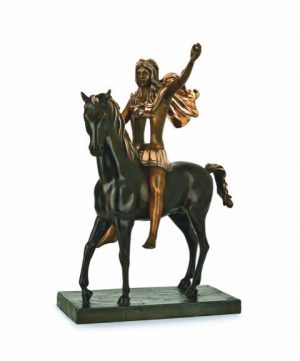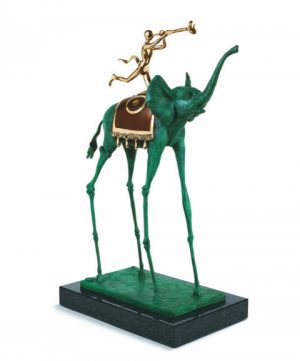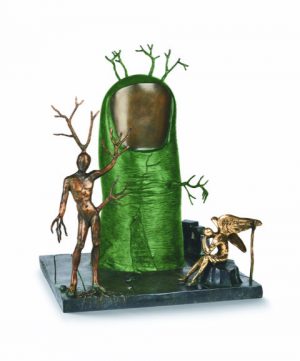This sculpture recalls Dalí’s 1937 oil painting Burning Giraffe, and unites two of his favorite motifs: female figure with drawers and fire.
The female figure here is composed largely of flames. These inextinguishable flames represent burning passion spreading from the feet upwards. Rising flames modelled in bronze give the impression that the whole figure is consumed by fire and seems to have a life of its own.
The woman’s physical appearance acquires a new perspective: crutches support her arched body and she is compartmentalized by drawers. Influenced by Freud’s theories, drawers were used by Dalí to symbolize the unconscious. As Dalí once said “The human body is full of secret drawers that can only be opened by psychoanalysis”. Aligning the figure’s torso and front leg, these partly opened drawers represent concealed sexuality of women. They act as an “entrance” into a woman’s interior world and represent our deepest desires and the mystery of hidden secrets.
The faceless figure represents all women, her beauty arising not merely from her sensuous form, but from a sense of inner mystery that seems to derive as much from what she chooses to withhold as to reveal.
Originally the figure was completely curved backwards. Mr Levi recounts Dalí throwing the wax model to the floor in a moment of rage when he suggested straightening the bust slightly. Without Gala’s help in reasoning with Dalí, the sculpture would not exist as it does today in this expressive, intimate form.
Date: conceived and first cast in 1980
Material: bronze
Technique: lost wax process
Edition size : 350 + 35 EA
Height : 84 cm
Edition : patina green
Maquette: original wax, Woman Aflame, 1980
Direct intervention (created by Dalí): the idea, image, and original maquette
Indirect intervention (created by artisans): lost wax process and patina






